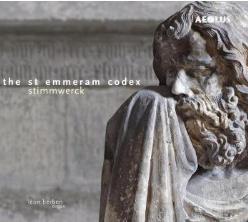St. Emmeram Mensural Codex (1440c)
St. Emmeram Mensural Codex (1440c) [2008]

1. Johannes Brassart (1400/05 - 1455) Motet: Christi mihi sublimato 2. Johannes Roullet (fl. ca 1435 - ca 1445) Sanctus (trope: Crux columpna preelecta) 3. Reginaldus Liebert (fl. ca 1425 - ca 1435) Fauxbourdon; Agnus dei 4. Gilles Binchois (ca 1400 - 1460) Contrafactum: Virgo rosa / Cest assés 5. Gilles Binchois: Buxheim Organ Book Adyen ma tres belle play 6. Francesco Landini (ca 1325 - 1397) Contrafactum: Kyrie / Questa fanciulla 7. Johannes Vaillant (fl.ca 1360 - ca 1390) Contrafactum; Ad honorem / Par maintes foys 8. Anon. Motet: O Maria virgo davidica / O Maria stella maris 9. Pierre Fontaine / Oswald von Wolkenstein: Buxheim Organ Book Vierhundert Jare 10. Johannes Brassart / Anon. Crist ist erstanden play 11. Rudolf Volkhardt von Höringen (ca 1395 - 1465) Levat autentica 12. Peter Schweikl (d. 1466) Sanctus (trope: Gustasti necis pocula) 13. Hermann Edlerawer (ca 1395 - ca 1460) Fauxbourdon sequence: Verbum bonum 14. Anon.; Buxheim Organ Book Cristus surrexit 15. Guillaume Du Fay (ca 1400 - 1474) Motet: Supremum est mortalibus 16. Guillaume Du Fay: Buxheim Organ Book Mille bon Jores 17. Arnold de Lantins (d. 1432) Tota pulchra es 18. Gilles Binchois: Buxheim Organ Book Aliud Esclaphe 19. Guillaume Du Fay: Buxheim Organ Book Sequitur adhuc semel Dulongesux 20. John Dunstaple (ca 1390 - 1453) Quam pulchra es 21. Leonel Power (d.1445) Anima mea liquefacta 22. Guillaume Du Fay: Buxheim Organ Book Portigaler 23. Anon. Canti: En naturarum dominus 24. Anon. Credo 25. Johannes Waring (fl. ca 1440 - ca 1460) Alleluia en trope Alle dei filius 26. Anon. Sanctus 27. Petrus Wilhelmi (ca 1400 - ca 1480) Rota: Presulem euphebeatum Stimmwerck: Franz Vitzthum (counter-tenor) Klaus Wenk (tenor) Gerhard Hölzle (tenor) Marcus Schmidl (bass) Guests: Eduard Burchards (counter-tenor) Christof Hartkopf, (baritone) Léon Berben, (gothic organ, Church of St. Andreas, Soest-Ostönnen, Germany)
Every once in a while, you chance upon a recording whose sheer, intrinsic beauty leaves you quite literally spellbound. For me, hearing this recording by the Munich-based vocal ensemble Stimmwerck was one of those rare moments: at almost every turn, immaculate blend, excellent tuning and impeccable diction characterise their interpretations of this incredible music. If you are a Medieval/Renaissance music aficionado and an advocate of groups like the Orlando Consort, the Hilliard Ensemble and particularly Capilla Flamenca or Ensemble Amarcord, truly, you will not be disappointed! (For those interested, more information about Stimmwerck is available on their homepage, and there is also a performance of Dunstable's 'Quam pulchra es' [track 20] on youtube).
The St Emmeram Codex, to which this recording is dedicated, is an important 15th-century manuscript from the German-speaking part of central Europe, originally owned by the priest and scholar Hermann Pötzlinger in the 1440s and currently housed in the Bayerische Staatsbibliothek in Munich. The idea of creating a programme of works from this Codex originated at the 2003 International Musicological Colloquium devoted to this source, following the instigation of Lorenz Welker (Ludwig-Maximilians-Universtität, Munich), Ian Rumbold (University of Nottingham, England) and Peter Wright (an independent scholar specialising in 15th-century music). [Incidentally, for those interested, the findings of the colloquium have also been published in a fascinating book, entitled Hermann Pötzlinger's Music Book: The St Emmeram Codex and its Contexts (Studies in Medieval and Renaissance Music)]. The diversity of the Codex's contents is truly staggering - its 255 pieces range from chant to sophisticated polyphony, span several European countries, cover a period of around 50 years and encompass pieces by some of the most important composers of the time (including Landini, Binchois, Dufay and Dunstable). Some of the works are well known, such as Dufay's magnificent isorhythmic motet 'Supremum est mortalibus' (track 15), and several pieces are contrafactum of secular pieces (notably tracks 4, 6 and 7); other pieces, in contrast, are unique to the St Emmeram Codex.
In the interests of presenting a coherent CD programme, Stimmwerck have primarily opted for a geographical division of the selected pieces, and this works well, allowing the music's stylistic breadth to shine through without ever leaving the impression of a haphazard miscellany. The programme also includes 7 pieces from the Buxheimer Orgelbuch, performed on one of the oldest organs in the world in playable condition (St. Andreas in Ostönnen, Germany) by Léon Berben, a renowned soloist on historical keyboard instruments in his own right. Berben often adopts a relatively free approach to the tactus in these pieces, imbuing them with a real sense of improvisation, one which is rarely heard in other performances of this repertoire. ---Maddy Evil, amazon.com
download: uploaded yandex 4shared mediafire solidfiles mega filecloudio nornar ziddu
Last Updated (Friday, 04 April 2014 20:10)








